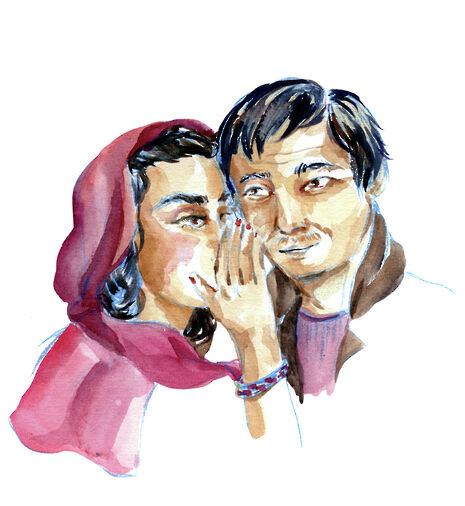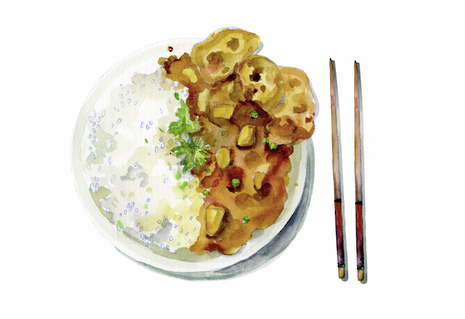Why can’t Cambridge embrace my interracial relationship?
Some might think that we live in a post-racial society. However, the regular stigmatisation of interracial relationships in Cambridge suggests that there is still a long way to go, writes Chandan Dhiman.

‘Wait, so how do your parents not know you guys have been dating for over eight months? That’s so weird!’ This is the question I have come to dread whenever my relationship is dissected amongst a group of non-BME individuals. While I usually try to explain how my cultural background prescribes the circumstances of my relationship, I am increasingly questioning whether it is my responsibility to educate people who call my culture ‘weird’. More often than not, I have found that is much easier to reply with ‘I can’t be bothered to explain it’.
I am an Indian woman, and I am completely aware that walking down the street with my Chinese boyfriend makes us a couple that is not especially common. I thought that one of the challenges we would face as a couple would be trying to reconcile our two differing cultures, and all of the values, traditions and beliefs which follow. However, while my boyfriend still teases me about my inability to use chopsticks correctly, I tease his inability to eat a spicy curry without sweating. I love learning about Chinese culture; the food, the language and the cultural responsibilities that come with being a young Chinese man. Through sharing our experiences as people of colour, and comparing our cultural identities, we share a unique dynamic in our relationship that brings us closer together all the time. What I hadn’t prepared myself for, was the cultural insensitivity I would face as people would question aspects of our relationship, which perhaps do not conform to the usual expectations.
As a child of an immigrant family, I have been raised in a fairly traditional environment where sexual conservatism is the norm. For me, it would be entirely inappropriate to tell my parents about my relationship, especially at a point in my life where there is an expectation that my focus should be aimed at establishing a career for myself, as opposed to finding myself a boyfriend. Obviously circumstances have changed, and it is very normal for young people to meet their partners during their youth, with Wednesday nights at Cindies being a breeding ground for hook-ups and potential relationships. However, out of respect for my parents' cultural attitudes, my siblings and I have all managed to maintain our relationships without our parents' knowledge. For my elder siblings, telling my parents about their partners was only seen to be necessary when my father was needed to foot the bill for our big, fat Indian weddings. Anyone who has seen Bend it Like Beckham knows the drill.

Sitting in a room with my parents and witnessing a television scene airing an innocent kiss is enough for everyone in the room to pretend they were doing anything else but watching television. Knowing that I would probably never have ‘the talk’ with my parents was comforting, especially after hearing horror stories from people who had. In my culture, it is just something that does not happen. I would honestly rather spend a whole night standing sober in the sweat-box that is Fez, than tell my mother how I used to fancy so-and-so during my GCSEs at secondary school.
Now, try explaining that to someone in Fez, who is rather tipsy, and whose tongue is slightly looser than usual. It is really not easy. And nine times out of ten, the next question which follows is: ‘How oblivious do your parents have to be to not know you’re dating?’ I find this statement probably the most bothersome, because not only is it a particularly intrusive question regarding my personal life, but it is also a question that I find quite stupid. It’s fairly easy to keep it a secret from your parents when you’ve spent a night picking vomit out of your hair after a nasty night out. It’s fairly easy to keep it a secret from your parents when you’ve managed to rack up a library fine that’s embarrassingly big. And it’s fairly easy not telling your parents you have a boyfriend. There are some aspects of our personalities that we choose to keep separate from our relationships with our parents – it does not make them ‘oblivious,’ but rather just like any other parent who doesn’t know every intimate detail about their child’s life. And having to feel like I have to justify this to people who are ‘oblivious’ to my culture is frustrating and tiresome.

I am incredibly proud to be an Indian at Cambridge – we have great food, a rich culture, and a moving history which I love to talk about when asked about by non-Indian individuals. Indian culture almost parallels Western culture in most senses, and it is unsurprising that those who are not aware of my culture, find some aspects of it alien. However, my time at Cambridge has made it explicit that individuals are completely unaware that certain comments they make about different cultures can be highly offensive and unwelcome. When I talk about how my culture has shaped my experiences, please do not respond with, ‘That’s so strange,’ ‘Why on earth do you guys do that?’ and, ‘Wow, that makes no sense to me.’ Not only do I feel as though you are attacking my culture, you are also attacking my confidence to speak about my identity. As a result, I have increasingly found it much easier to subdue myself in conversation, than try to have to justify my culture to those who do not respect it. You are inadvertently silencing me because I do not conform to your Western conceptions of what a student of Cambridge should be like.
Instead, I hope that you tell me the how fascinating it is that my culture differs from yours. Tell me how you love Indian food, and about that kitchen disaster that occurred when you tried to cook a curry. Tell me about how you love that one Indian song they seem to play at every club in Cambridge on a night out. Ask me about India, and all the places there you plan to travel to. But please do not mock my culture because it is different to yours, try to embrace it. In an environment like Cambridge, which is so diverse and rich in cultures from all around the world, take advantage of your ability to learn about different people and how their skin colour or culture has made their journey to Cambridge unlike yours. Take a little bit of your time to listen to the experience of someone different to you – the things you hear might change your outlook on your time at Cambridge. And who knows, maybe soon enough, interracial relationships like my own might not seem so uncommon
 Comment / Plastic pubs: the problem with Cambridge alehouses 5 January 2026
Comment / Plastic pubs: the problem with Cambridge alehouses 5 January 2026 News / Cambridge businesses concerned infrastructure delays will hurt growth5 January 2026
News / Cambridge businesses concerned infrastructure delays will hurt growth5 January 2026 News / New movement ‘Cambridge is Chopped’ launched to fight against hate crime7 January 2026
News / New movement ‘Cambridge is Chopped’ launched to fight against hate crime7 January 2026 News / AstraZeneca sues for £32 million over faulty construction at Cambridge Campus31 December 2025
News / AstraZeneca sues for £32 million over faulty construction at Cambridge Campus31 December 2025 Interviews / You don’t need to peak at Cambridge, says Robin Harding31 December 2025
Interviews / You don’t need to peak at Cambridge, says Robin Harding31 December 2025









